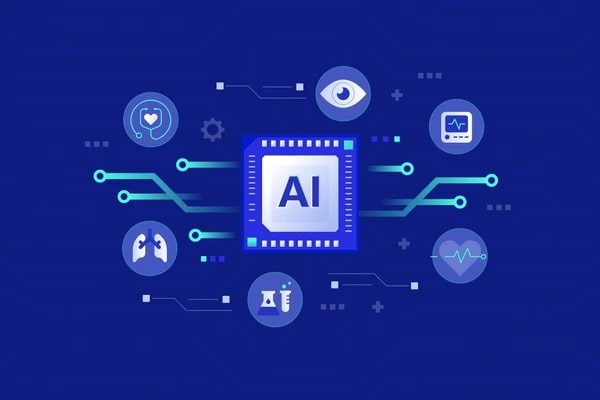
Future of Artificial Intelligence in Healthcare
- Posted by 3.0 University
- Categories Artificial Intelligence
- Date September 13, 2024
- Comments 0 comment
Shaping the Future of Medicine
Exponential transformation has been witnessed in AI in healthcare, specifically, AI in medical field, signifying how AI is revolutionizing healthcare through diverse AI applications in healthcare.
It has co-equally enhanced diagnostics, treatment, and patient care.
Principally, the benefits of AI in healthcare include unprecedented accuracy and efficiency, and the future of AI in healthcare, driven by innovations like generative AI in healthcare, holds immense potential to redefine AI in medicine and its applications, making it a cornerstone of modern medicine.
Continuing the growth story…
Key AI Applications in Healthcare
There is such a variety of AI applications in healthcare that it is tough to keep up. Furthermore, new technology is constantly evolving.
There are a few cases where AI plays a key role:
- Diagnostic Accuracy
In this field, AI Waston and AI DeepMind are examples that are successful in diagnosing cancer, cardiovascular diseases, and some neurological diseases.
Artificial intelligence based on massive data analysis can capture hidden symptoms that humans may find difficult to notice. It is particularly vital in the early diagnosis stage, where immediate attention can lead to successful treatment.
- Robotic Surgery
AI-based robotic systems abundantly support surgeons with viz. the Da Vinci Surgical System, to assist them in completing difficult and complex operations with the highest achievable precision.
These systems should allow the use of smaller cuts, which eventually lowers the risk of blood loss and the time a patient needs for recovery.
As a result, all of these contribute to improving patient overall health outcomes.
- Personalized Treatment Plans
That is no secret; each person’s organism reacts to a medication in different ways, and the use of AI in medicine simplifies the process of creating individual healthcare plans.
By considering genetic, environmental, and lifestyle elements, AI offers treatment programs that correct a patient’s unique rearing.
For instance, AI can recommend chemotherapy medications for cancer patients based on their genetic makeup to achieve the desired results.
- Virtual Health Assistants
In addition to Babylon Health, many other virtual assistants driven by AI and chatbots are currently health dealers, informing patients about how to treat their symptoms, make an appointment, and give them wellness tips.
This improvement helps to relieve the pressure on healthcare networks while they are suffering from the raised demand for the COVID-19 pandemic and other high demand periods, such as the pre-pandemic phase.
The Benefits of AI in Healthcare
The advantages of AI in healthcare are exceedingly profuse and extensive as it extensively ranges from enhancing effectiveness and improving the accuracy of medical procedures – thus developing the methods to save time and reduce costs.
Here are some key advantages:
- Improved Accuracy
Thanks to its capacity for data processing and analysis, AI can detect subtle patterns that a human expert may fail to.
This has resulted in more precise diagnoses and treatment recommendations.
- Speed and Efficiency
In a period when time is often of the essence for saving lives, AI can reach speeds that are difficult to achieve for a human being.
As a matter of fact, machines can unravel patient data quicker than an actual doctor could get any indication of it, leading to physicians with findings that may take them days to arrive at manually.
- Cost-Effectiveness
Automation in routine duties, like image analysis and data entry, brings physicians more time to deal with the critical tasks.
As a result, this not only improves the working process, but also reduces healthcare provision costs.
- Enhanced Patient Engagement
Applying AI-based health care applications will allow patients to actively monitor their health and interact more effectively with their medical data.
This way, they can pursue healthy lifestyles based on more accurate information and also take the right decisions for treatments.
Generative AI in Healthcare
Generative AI in healthcare refers to a health care system that can create content or solutions through data input.
The most common application of generative AI comes in the field of drug discovery. By comparing already existing data and molecular structures, generative models can propose new drugs or treatments which might work against certain conditions.
To illustrate, generative AI technology is being used to structure personalized medications for patients with rare diseases. This speeds up the drug discovery process, which typically takes years and costs billions, by generating probable solutions much quicker than the conventional ways.
Future Potential of Generative AI
The future of AI in healthcare will see the utilization of generative AI not only in drug discovery but also in the creation of new diagnostic tools and treatment protocols.
Its relevance will keep on rising and it might even get to a point of predicting disease outbreaks and developing various health strategies on a global level.
Ethical and Legal Considerations
It won’t be amiss if it can be called as a revolution in AI in healthcare, as this, undoubtedly, brings some advancements that are worth stating, but it’s necessary to be aware of the ethical and legal issues that come along with it.
AI utilization in the medical sector issues related to the protection of client data, privacy and device safety.
Who is responsible when an AI system makes an error?
These are important questions that healthcare systems and countries must address as the integration of AI in medical practices becomes more widespread.
Ensuring Patient Privacy
The significant amounts of data AI systems require, hospital and patient confidentiality, are brought to the forefront.
It’s critical that, as AI technology advances, the protective measures of patient data from unauthorized access should also improve.
The Future of AI in Healthcare
Going forward, the future of AI in healthcare does have a lot of promises.
One can predict that AIs with more sophisticated software will significantly impact healthcare solutions on a more personal and precise level.
Without a doubt, the coming period will involve AI’s not only aiding but also cutting clear paths and going a long way in healthcare, right from robotized surgeries to the advent of AI being the whole diagnostic and treatment outfit.
AI-Powered Preventive Care
AI would be a figurehead in preventive medicine, and it would be used to tell the truth about chances before the pudendal body could announce the symptoms.
Basing on the data standing from health history, lifestyle, habits, etc. the computer can predict the diseases that are likely to fall on an individual and suggest the measures you should take to avoid the emotional and physical pain coming your way.
AI in Mental Health
AI does not only serve physical condition.
Some of the tools that are under development are out to find mental health problems.
Machine learning based artificial intelligence can analyse the key patterns of behaviour and stage preclinical problems like mood disorders, depression, and even Alzheimer’s.
Reducing Healthcare Inequalities
AI can be the saviour of healthcare.
People at the far-off corners or areas which could not have full access to technology might now be able to talk to doctors online, get a machine to give them diagnosis, and even more based on the data received about their health.
The idea is concrete that as AI is paired with technology, one could probe their health condition and so use automation that they would not be able to avail of in telemedicine.
Essentially, disparities around the world would be snubbed off.
In a nutshell,
Ultimately, the integration of AI heralds a new era of precision, personalization, and progress in the medical field, promising a brighter, more efficient future for global healthcare.
You may also like

AI-Driven Cyber Threats

AI Education and Job Market in 2025

